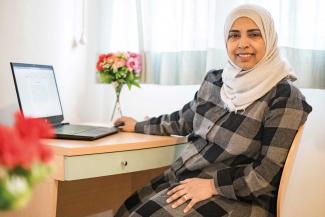Philipp Schwartz Initiative
Safety and new jobs for displaced scholars

“After the Arab Spring protests in 2011, the situation in my homeland became increasingly difficult,” Ghanya Al-Naqeb recalls. Al-Naqeb is from Yemen and has a PhD in food chemistry. When the multi-front civil war erupted in 2015, she was teaching and researching at Sana'a University. Suddenly everyone was a potential enemy. Harassment got worse, including on campus.
“Water and electric power were sometimes cut off completely at work,” she says. “Moreover, I did not receive a salary for two years.” When researchers from her department began to disappear, she knew anything could happen to her at any time. “I feared for my life.”
Al-Naqeb drew attention to her situation at an international conference in Washington. Klaus Krickeberg, a German mathematician, wanted to help and put her in touch with Leane Lehmann, a professor of food chemistry at Julius Maximilian University in Würzburg. Lehman, as the potential mentor, and Al-Naqueb, as a researcher at risk, applied for support from the Philipp Schwartz Initiative. “It worked out and that was such a gift, it felt like God’s blessing,” says Al-Naqeb.
Funding for universities
Since 2016, the Humboldt Foundation’s Philipp Schwartz Initiative has been awarding funds to German universities and research institutes so they can host at-risk researchers for two years. Host institutions receive funding for a research fellowship or contractual employment. The Humboldt Foundation enables over 2000 scholars a year from all over the world to do research in Germany. Currently, PSI is also helping vulnerable researchers from Ukraine and Afghanistan (see box).
The initiative is named after the German pathologist Philipp Schwartz. He was a professor in Frankfurt, but was dismissed without notice because of his Jewish heritage when the Nazis came to power in 1933. Schwartz fled to Switzerland, where he founded the Emergency Society of German Scholars Abroad. The idea was to help persecuted scholars find work in other countries. The organisation supported several hundred displaced researchers.
In view of Germany’s historical responsibility, the Humboldt Foundation long considered how best to support persecuted scholars. It established contact with like-minded organisations like the New York-based Institute of International Education’s Scholar Rescue Fund (IIE-SRF), the international network Scholars at Risk Network (SAR) and the Council for Assisting Refugee Academics (CARA) in Britain. Some of these agencies were founded in response to Nazi rule in Germany. Nonetheless, no German institution had contributed to their work.
In 2015, hundreds of thousands of refugees arrived in Germany, including many academics and researchers. With help from Germany’s Foreign Office, the Humboldt Foundations established an entire support programme within a few month. Frank-Walter Steinmeier, then serving as foreign minister, announced the establishment of the Philipp Schwartz Initiative at Humboldt’ Foundation’s annual conference in Berlin in June.
To date, 330 fellows have been chosen in 10 selection rounds. Ninety-seven German universities and research institutes have agreed to act as hosts. Ghanya Al-Naqeb had to wait four months for her visa until she was able to emigrate via Sudan and resume her work in Würzburg in 2017.
“I took a course to learn German and continued my work in the university lab with plants that I had brought along from Yemen,” she recalls. She found the language barrier challenging. Work in a highly advanced laboratory felt strange too. “The team acted in a very inclusive manner, and I am most thankful for the opportunity to keep working on my own research,” she reports.
In the fall of 2008, the Foreign Office and the German parliament, the Bundestag, turned the Philipp Schwartz Initiative into a permanent programme. This important step received parliamentary support across parties. Germany has thus became an advocate for researchers at risk and is finally rising to its international responsibility.
Personal perspectives
The initial hope was that many Patrick Schwartz fellows would be able to return to their home countries soon and then contribute to rebuilding them. In most cases, that has not happened. Therefore, the Schwartz Initiative is now working on finding long-term perspectives for the persons concerned. Permanent employment is important. So far, over 66 % of former Philipp-Schwartz fellows have found a new position immediately after their fellowship ended.
Food chemist Ghanya Al-Naqeb was not able to return to Yemen because of the ongoing civil war. But thanks to the contacts that she made during her time in Germany, she successfully applied to the University of Trento in northern Italy, where she now works.
The Philipp Schartz Initiative has attracted international attention. For example, the Collège de France has set up a support programme of its own, following the Philipp Schwartz example. Both programmes are now involved in Inspireurope, an EU project that links ten institutions from nine European countries in efforts to promote researchers at risk.
Mareike Ilsemann is a public relations officer at the Alexander von Humboldt Foundation.
Schwartz-Initiative@avh.de
Link
Philipp Schwartz Initiative: https://www.humboldt-foundation.de/bewerben/foerderprogramme/philipp-schwartz-initiative







